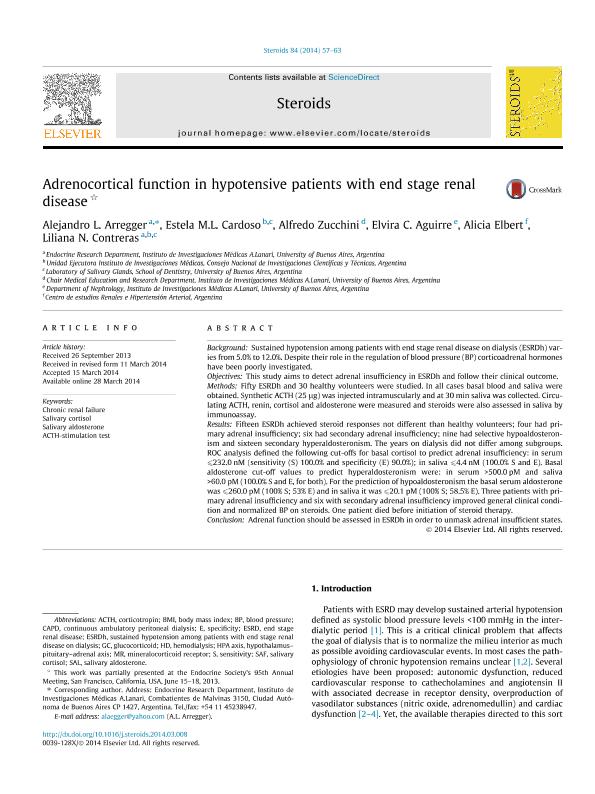Artículo
Adrenocotrical function in hypotensive patients with end stage renal disease
Arregger, Alejandro Luis ; Cardoso, Estela M. del Luján
; Cardoso, Estela M. del Luján ; Zucchini, Alfredo Enrique; Aguirre, Elvira C.; Elbert, Alicia; Contreras, Liliana Noemí
; Zucchini, Alfredo Enrique; Aguirre, Elvira C.; Elbert, Alicia; Contreras, Liliana Noemí
 ; Cardoso, Estela M. del Luján
; Cardoso, Estela M. del Luján ; Zucchini, Alfredo Enrique; Aguirre, Elvira C.; Elbert, Alicia; Contreras, Liliana Noemí
; Zucchini, Alfredo Enrique; Aguirre, Elvira C.; Elbert, Alicia; Contreras, Liliana Noemí
Fecha de publicación:
03/2014
Editorial:
Elsevier
Revista:
Steroids
ISSN:
0039-128X
Idioma:
Inglés
Tipo de recurso:
Artículo publicado
Clasificación temática:
Resumen
Background: Sustained hypotension among patients with end stage renal disease on dialysis (ESRDh) varies from 5.0% to 12.0%. Despite their role in the regulation of blood pressure (BP) corticoadrenal hormones have been poorly investigated.
Objectives: This study aims to detect adrenal insufficiency in ESRDh and follow their clinical outcome.
Methods: Fifty ESRDh and 30 healthy volunteers were studied. In all cases basal blood and saliva were obtained. Synthetic ACTH (25 μg) was injected intramuscularly and at 30 min saliva was collected. Circulating ACTH, renin, cortisol and aldosterone were measured and steroids were also assessed in saliva by immunoassay.
Results: Fifteen ESRDh achieved steroid responses not different than healthy volunteers; four had primary adrenal insufficiency; six had secondary adrenal insufficiency; nine had selective hypoaldosteronism and sixteen secondary hyperaldosteronism. The years on dialysis did not differ among subgroups. ROC analysis defined the following cut-offs for basal cortisol to predict adrenal insufficiency: in serum ⩽232.0 nM (sensitivity (S) 100.0% and specificity (E) 90.0%); in saliva ⩽4.4 nM (100.0% S and E). Basal aldosterone cut-off values to predict hyperaldosteronism were: in serum >500.0 pM and saliva >60.0 pM (100.0% S and E, for both). For the prediction of hypoaldosteronism the basal serum aldosterone was ⩽260.0 pM (100% S; 53% E) and in saliva it was ⩽20.1 pM (100% S; 58.5% E). Three patients with primary adrenal insufficiency and six with secondary adrenal insufficiency improved general clinical condition and normalized BP on steroids. One patient died before initiation of steroid therapy.
Conclusion: Adrenal function should be assessed in ESRDh in order to unmask adrenal insufficient states.
Archivos asociados
Licencia
Identificadores
Colecciones
Articulos(IDIM)
Articulos de INST.DE INVEST.MEDICAS
Articulos de INST.DE INVEST.MEDICAS
Citación
Arregger, Alejandro Luis; Cardoso, Estela M. del Luján; Zucchini, Alfredo Enrique; Aguirre, Elvira C.; Elbert, Alicia; et al.; Adrenocotrical function in hypotensive patients with end stage renal disease; Elsevier; Steroids; 84; 3-2014; 57-63
Compartir
Altmétricas



